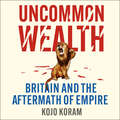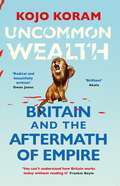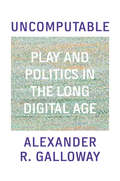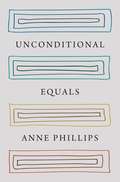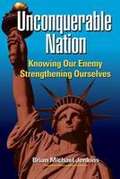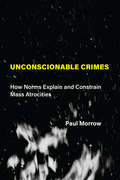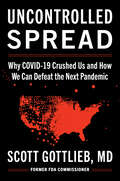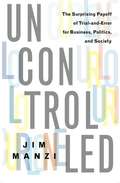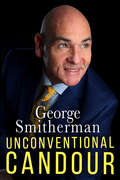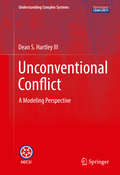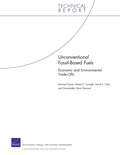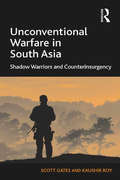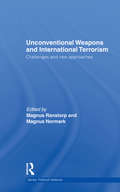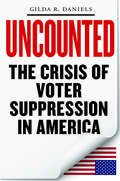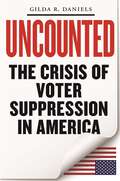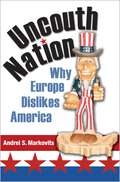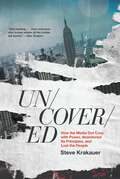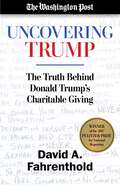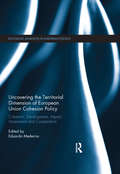- Table View
- List View
Uncommon Wealth: Britain and the Aftermath of Empire
by Kojo Koram'BRILLIANTLY ARRANGED AND RICH WITH FRESH INSIGHTS, UNCOMMON WEALTH REMINDS US HOW THE FORGOTTEN STORIES OF EMPIRE AND DECOLONISATION CONTINUE TO IMPACT OUR DAILY LIVES IN BRITAIN - AND THROUGHOUT THE WORLD - UP TO TODAY' AKALABritain didn't just put the empire back the way it had found it.In Uncommon Wealth, Kojo Koram traces the tale of how after the end of the British empire an interconnected group of well-heeled British intellectuals, politicians, accountants and lawyers offshored their capital, seized assets and saddled debt in former 'dependencies'. This enabled horrific inequality across the globe as ruthless capitalists profited and ordinary people across Britain's former territories in colonial Africa, Asia and the Caribbean were trapped in poverty. However, the reinforcement of capitalist power across the world also ricocheted back home. Now it has left many Britons wondering where their own sovereignty and prosperity has gone...Decolonisation was not just a trendy buzzword. It was one of the great global changes of the past hundred years, yet Britain - the protagonist in the whole, messy drama - has forgotten it was ever even there. A blistering uncovering of the scandal of Britain's disastrous treatment of independent countries after empire, Uncommon Wealth shows the decisions of decades past are contributing to the forces that are breaking Britain today.(P) Hodder & Stoughton Limited
Uncommon Wealth: Britain and the Aftermath of Empire
by Kojo Koram'BRILLIANTLY ARRANGED AND RICH WITH FRESH INSIGHTS, UNCOMMON WEALTH REMINDS US HOW THE FORGOTTEN STORIES OF EMPIRE AND DECOLONISATION CONTINUE TO IMPACT OUR DAILY LIVES IN BRITAIN - AND THROUGHOUT THE WORLD - UP TO TODAY' AKALA'A RADICAL, BEAUTIFULLY WRITTEN UNDERSTANDING OF OUR HISTORY - INGENIOUSLY PLACING BRITAIN'S RECENT TUMULT INTO CONTEXT' - OWEN JONESBritain didn't just put the empire back the way it had found it.In Uncommon Wealth, Kojo Koram traces the tale of how after the end of the British empire an interconnected group of well-heeled British intellectuals, politicians, accountants and lawyers offshored their capital, seized assets and saddled debt in former 'dependencies'. This enabled horrific inequality across the globe as ruthless capitalists profited and ordinary people across Britain's former territories in colonial Africa, Asia and the Caribbean were trapped in poverty. However, the reinforcement of capitalist power across the world also ricocheted back home. Now it has left many Britons wondering where their own sovereignty and prosperity has gone...Decolonisation was not just a trendy buzzword. It was one of the great global changes of the past hundred years, yet Britain - the protagonist in the whole, messy drama - has forgotten it was ever even there. A blistering uncovering of the scandal of Britain's disastrous treatment of independent countries after empire, Uncommon Wealth shows the decisions of decades past are contributing to the forces that are breaking Britain today.
Uncommon Wealth: Britain and the Aftermath of Empire
by Kojo Koram'BRILLIANTLY ARRANGED AND RICH WITH FRESH INSIGHTS, UNCOMMON WEALTH REMINDS US HOW THE FORGOTTEN STORIES OF EMPIRE AND DECOLONISATION CONTINUE TO IMPACT OUR DAILY LIVES IN BRITAIN - AND THROUGHOUT THE WORLD - UP TO TODAY' AKALABritain didn't just put the empire back the way it had found it.In Uncommon Wealth, Kojo Koram traces the tale of how after the end of the British empire an interconnected group of well-heeled British intellectuals, politicians, accountants and lawyers offshored their capital, seized assets and saddled debt in former 'dependencies'. This enabled horrific inequality across the globe as ruthless capitalists profited and ordinary people across Britain's former territories in colonial Africa, Asia and the Caribbean were trapped in poverty. However, the reinforcement of capitalist power across the world also ricocheted back home. Now it has left many Britons wondering where their own sovereignty and prosperity has gone...Decolonisation was not just a trendy buzzword. It was one of the great global changes of the past hundred years, yet Britain - the protagonist in the whole, messy drama - has forgotten it was ever even there. A blistering uncovering of the scandal of Britain's disastrous treatment of independent countries after empire, Uncommon Wealth shows the decisions of decades past are contributing to the forces that are breaking Britain today.
Uncommon Wrath: How Caesar and Cato's Deadly Rivalry Destroyed the Roman Republic
by Josiah OsgoodA dual biography of Julius Caesar and Cato the Younger that offers a dire warning: republics collapse when partisanship overrides the common good. In Uncommon Wrath, historian Josiah Osgood tells the story of how the political rivalry between Julius Caesar and Marcus Cato precipitated the end of the Roman Republic. As the champions of two dominant but distinct visions for Rome, Caesar and Cato each represented qualities that had made the Republic strong, but their ideological differences entrenched into enmity and mutual fear. The intensity of their collective factions became a tribal divide, hampering their ability to make good decisions and undermining democratic government. The men&’s toxic polarity meant that despite their shared devotion to the Republic, they pushed it into civil war. Deeply researched and compellingly told, Uncommon Wrath is a groundbreaking biography of two men whose hatred for each other destroyed the world they loved.
Uncomputable: Play and Politics In the Long Digital Age
by Alexander GallowayA journey through the uncomputable remains of computer historyNarrating some lesser known episodes from the deep history of digital machines, Alexander R. Galloway explains the technology that drives the world today, and the fascinating people who brought these machines to life. With an eye to both the computable and the uncomputable, Galloway shows how computation emerges or fails to emerge, how the digital thrives but also atrophies, how networks interconnect while also fray and fall apart. By re-building obsolete technology using today's software, the past comes to light in new ways, from intricate algebraic patterns woven on a hand loom, to striking artificial-life simulations, to war games and back boxes. A description of the past, this book is also an assessment of all that remains uncomputable as we continue to live in the aftermath of the long digital age.
Unconditional Equality: Gandhi's Religion of Resistance (Cultural Critique Books)
by Ajay SkariaUnconditional Equality examines Mahatma Gandhi&’s critique of liberal ideas of freedom and equality and his own practice of a freedom and equality organized around religion. It reconceives satyagraha (passive resistance) as a politics that strives for the absolute equality of all beings. Liberal traditions usually affirm an abstract equality centered on some form of autonomy, the Kantian term for the everyday sovereignty that rational beings exercise by granting themselves universal law. But for Gandhi, such equality is an &“equality of sword&”—profoundly violent not only because it excludes those presumed to lack reason (such as animals or the colonized) but also because those included lose the power to love (which requires the surrender of autonomy or, more broadly, sovereignty).Gandhi professes instead a politics organized around dharma, or religion. For him, there can be &“no politics without religion.&” This religion involves self-surrender, a freely offered surrender of autonomy and everyday sovereignty. For Gandhi, the &“religion that stays in all religions&” is satyagraha—the agraha (insistence) on or of satya (being or truth).Ajay Skaria argues that, conceptually, satyagraha insists on equality without exception of all humans, animals, and things. This cannot be understood in terms of sovereignty: it must be an equality of the minor.
Unconditional Equals
by Anne PhillipsWhy equality cannot be conditional on a shared human “nature” but has to be for allFor centuries, ringing declarations about all men being created equal appealed to a shared human nature as the reason to consider ourselves equals. But appeals to natural equality invited gradations of natural difference, and the ambiguity at the heart of “nature” enabled generations to write of people as equal by nature while barely noticing the exclusion of those marked as inferior by their gender, race, or class. Despite what we commonly tell ourselves, these exclusions and gradations continue today. In Unconditional Equals, political philosopher Anne Phillips challenges attempts to justify equality by reference to a shared human nature, arguing that justification turns into conditions and ends up as exclusion. Rejecting the logic of justification, she calls instead for a genuinely unconditional equality.Drawing on political, feminist, and postcolonial theory, Unconditional Equals argues that we should understand equality not as something grounded in shared characteristics but as something people enact when they refuse to be considered inferiors. At a time when the supposedly shared belief in human equality is so patently not shared, the book makes a powerful case for seeing equality as a commitment we make to ourselves and others, and a claim we make on others when they deny us our status as equals.
Unconquerable Nation: Knowing Our Enemy, Strengthening Ourselves
by Brian Michael JenkinsThe author presents a clear-sighted and sobering analysis of where we are today in the struggle against terrorism. Jenkins, an internationally renowned authority on terrorism, distills the jihadists?? operational code and outlines a pragmatic but principled approach to defeating the terrorist enterprise. We need to build upon our traditions of determination and self-reliance, he argues, and above all, preserve our commitment to American values.
Unconscionable Crimes: How Norms Explain and Constrain Mass Atrocities
by Paul C. MorrowThe first general theory of the influence of norms--moral, legal and social--on genocide and mass atrocity.How can we explain--and prevent--such large-scale atrocities as the Holocaust? In Unconscionable Crimes, Paul Morrow presents the first general theory of the influence of norms--moral, legal and social--on genocide and mass atrocity. After offering a clear overview of norms and norm transformation, rooted in recent work in moral and political philosophy, Morrow examines numerous twentieth-century cases of mass atrocity, drawing on documentary and testimonial sources to illustrate the influence of norms before, during, and after such crimes.
Uncontrolled Spread: Why COVID-19 Crushed Us and How We Can Defeat the Next Pandemic
by Scott GottliebNEW YORK TIMES BESTSELLER“Uncontrolled Spread is everything you’d hope: a smart and insightful account of what happened and, currently, the best guide to what needs to be done to avoid a future pandemic." —Wall Street Journal“Informative and well paced.”—The Guardian“An intense ride through the pandemic with chilling details of what really happened. It is also sprinkled with notes of true wisdom that may help all of us better prepare for the future.”—Sanjay Gupta, MD, chief medical correspondent, CNNPhysician and former FDA commissioner Scott Gottlieb asks: Has America’s COVID-19 catastrophe taught us anything?In Uncontrolled Spread, he shows how the coronavirus and its variants were able to trounce America’s pandemic preparations, and he outlines the steps that must be taken to protect against the next outbreak. As the pandemic unfolded, Gottlieb was in regular contact with all the key players in Congress, the Trump administration, and the drug and diagnostic industries. He provides an inside account of how level after level of American government crumbled as the COVID-19 crisis advanced.A system-wide failure across government institutions left the nation blind to the threat, and unable to mount an effective response. We’d prepared for the wrong virus. We failed to identify the contagion early enough and became overly reliant on costly and sometimes divisive tactics that couldn’t fully slow the spread. We never considered asymptomatic transmission and we assumed people would follow public health guidance. Key bureaucracies like the CDC were hidebound and outmatched. Weak political leadership aggravated these woes. We didn’t view a public health disaster as a threat to our national security.Many of the woes sprung from the CDC, which has very little real-time reporting capability to inform us of Covid’s twists and turns or assess our defenses. The agency lacked an operational capacity and mindset to mobilize the kind of national response that was needed. To guard against future pandemic risks, we must remake the CDC and properly equip it to better confront crises. We must also get our intelligence services more engaged in the global public health mission, to gather information and uncover emerging risks before they hit our shores so we can head them off. For this role, our clandestine agencies have tools and capabilities that the CDC lacks.Uncontrolled Spread argues we must fix our systems and prepare for a deadlier coronavirus variant, a flu pandemic, or whatever else nature -- or those wishing us harm -- may threaten us with. Gottlieb outlines policies and investments that are essential to prepare the United States and the world for future threats.
Uncontrolled: The Surprising Payoff of Trial-and-Error for Business, Politics, and Society
by Jim ManziEntrepreneur and political commentator Jim Manzi argues for a radical new approach to our most pressing economic and social problems, using the scientific methodOCoand its controlled experiments and skeptical mindsetOCoto test what works in business and gover"
Unconventional Candour: The Life and Times of George Smitherman
by George SmithermanGeorge Smitherman tells all about his successes and failures as a politician — in Ontario's legislature and in Toronto's city hall — and shares the joys and sorrows of his personal life. From modest beginnings, George Smitherman rose to become one of the most powerful politicians in Ontario and then plummeted, defeated by one of the most notorious: Rob Ford. This memoir takes readers on the roller-coaster ride of his career and his personal life as a gay man struggling with the constraints of society and family. Smitherman offers candid insights into the hardball politics of city hall and the provincial legislature, as well as the Liberal government under Dalton McGuinty, including accomplishments like prescription drug reforms and the green energy plan, and the so-called eHealth, Ornge, and gas plant scandals. He reveals how he lost the mayoral race but managed to rebound from that defeat, as well from the suicide of his husband. .
Unconventional Conflict: A Modeling Perspective (Understanding Complex Systems)
by Dean S. Hartley IIIThis book describes issues in modeling unconventional conflict and suggests a new way to do the modeling. It presents an ontology that describes the unconventional conflict domain, which allows for greater ease in modeling unconventional conflict. Supporting holistic modeling, which means that we can see the entire picture of what needs to be modeled, the ontology allows us to make informed decisions about what to model and what to omit. The unconventional conflict ontology also separates the things we understand best from the things we understand least. This separation means that we can perform verification, validation and accreditation (VV&A) more efficiently and can describe the competence of the model more accurately.However, before this message can be presented in its entirety the supporting body of knowledge has to be explored. For this reason, the book offers chapters that focus on the description of unconventional conflict and the analyses that have been performed, modeling, with a concentration on past efforts at modeling unconventional conflict, the precursors to the ontology, and VV&A. Unconventional conflict is a complex, messy thing. It normally involves multiple actors, with their own conflicting agendas and differing concepts of legitimate actions. This book will present a useful introduction for researchers and professionals within the field.
Unconventional Emergency Management Research (Reports of China’s Basic Research)
by Weicheng FanThis book mainly introduces the research overview, research results and follow-up prospects of “Unconventional Emergency Management Research”, a major research plan of National Natural Science Foundation of China (hereinafter referred to as the Plan). The Plan has carried out innovative research around major strategic fields and directions on emergency management. A total of 121 projects were funded by the Plan, including 92 Fostering Projects, 25 Key Projects and 4 Integrated Projects, with a total funding of 120 million RMB. From the perspective of major national needs and scientific discipline development, the book focuses on three key scientific issues: information processing and evolution modeling of unconventional emergencies, emergency decision-making theory of unconventional emergencies, and psychological and behavioral response laws of individuals and groups in emergency situations. The publication of this book aims to provide more powerful support for the research and exploration in public security and emergency management.
Unconventional Fossil-Based Fuels
by David S. Ortiz Michael Toman Aimee E. Curtright Joel Darmstadter Brian ShannonIn this report, RAND researchers assess the potential future production levels, production costs, greenhouse gases, and other environmental implications of synthetic crude oil from oil sands and fuels produced via coal liquefaction relative to conventional petroleum-based transportation fuels. The findings indicate the potential cost-competitiveness of these alternative fuels and potential economic-environmental trade-offs from their deployment.
Unconventional Warfare in South Asia: Shadow Warriors and Counterinsurgency (Critical Essays On Warfare In South Asia, 1947 To The Present Ser.)
by Kaushik Roy Scott GatesIndia is the world's tenth largest economy and possesses the world's fourth largest military. The subcontinent houses about one-fifth of the world's population and its inhabitants are divided into various tribes, clans and ethnic groups following four great religions: Buddhism, Christianity, Hinduism, and Islam. Framing the debate using case studies from across the region as well as China, Afghanistan and Burma and using a wealth of primary and secondary sources this incisive volume takes a closer look at the organization and doctrines of the 'shadow armies' and the government forces which fight the former. Arranged in a thematic manner, each chapter critically asks; Why stateless marginal groups rebel? How do states attempt to suppress them? What are the consequences in the aftermath of the conflict especially in relation to conflict resolution and peace building? Unconventional Warfare in South Asia is a welcomed addition to the growing field of interest on civil wars and insurgencies in South Asia. An indispensable read which will allow us to better understand whether South Asia is witnessing a 'New War' and whether the twenty-first century belongs to the insurgents.
Unconventional Water Resources
by Vladimir Smakhtin Manzoor Qadir Sasha Koo-Oshima Edeltraud GuentherThe world is faced with a growing number of complex and interconnected challenges. Water is among the top 5 global risks in terms of impacts, which would be far reaching beyond socio-economic challenges, impacting livelihoods and wellbeing of the people.As freshwater resources and population densities are unevenly distributed across the world, some regions and countries are already water scarce. Water scarcity is expected to intensify in regions like the Middle East and North Africa (MENA), which has 6% of the global population, but only 1% of the world’s freshwater resources. Climate change adds to this complexity as it is leading to rainfall uncertainty and extended droughts periods, mostly in arid areas.Increasing water scarcity is now recognized as a major cause of conflict, social unrest and migration and at the same time water is increasingly considered as an instrument for international cooperation to achieve sustainable development. Tapping and assessing sustainably every available option in water-scarce areas is needed as pressure continues to build on limited water resources.The stark fact is that conventional water provisioning approaches relying on snowfall, rainfall and river runoff are not enough to meet growing freshwater demand in water-scarce areas. Water-scarce countries need a radical re-think of water resource planning and management that includes the creative exploitation of a growing set of viable but unconventional water resources for food production, livelihoods, ecosystems, climate change adaption, and sustainable development. Unconventional water resources are generated as a by-product of specialized processes; need suitable pre-use treatment; require pertinent on-farm management when used for irrigation; or result from a special technology to collect/access water.
Unconventional Weapons and International Terrorism: Challenges and New Approaches (Political Violence)
by Magnus Ranstorp Magnus NormarkIn recent years, senior policy officials have highlighted increased signs of convergence between terrorism and unconventional (CBRN) weapons. Terrorism now involves technologies available to anyone, anywhere, anytime, deployed through innovative solutions. This indicates a new and more complex global security environment with increasing risks of terrorists trying to acquire and deploy a CBRN (Chemical Biological Radiological Nuclear) attack. This book addresses the critical importance of understanding innovation and decision-making between terrorist groups and unconventional weapons, and the difficulty in pinpointing what factors may drive violence escalation. It also underscores the necessity to understand the complex interaction between terrorist group dynamics and decision-making behaviour in relation to old and new technologies. Unconventional Weapons and International Terrorism seeks to identify a set of early warnings and critical indicators for possible future terrorist efforts to acquire and utilize unconventional CBRN weapons as a means to pursue their goals. It also discusses the challenge for intelligence analysis in handling threat convergence in the context of globalisation. The book will be of great interest to students of terrorism studies, counter-terrorism, nuclear proliferation, security studies and IR in general.
Uncounted: The Crisis of Voter Suppression in America
by Gilda R. DanielsAn answer to the assault on voting rights—crucial reading in advance of the 2020 presidential electionThe Voting Rights Act of 1965 is considered one of the most effective pieces of legislation the United States has ever passed. It enfranchised hundreds of thousands of voters, particularly in the American South, and drew attention to the problem of voter suppression. Yet in recent years there has been a continuous assault on access to the ballot box in the form of stricter voter ID requirements, meritless claims of rigged elections, and baseless accusations of voter fraud. In the past these efforts were aimed at eliminating African American voters from the rolls, and today, new laws seek to eliminate voters of color, the poor, and the elderly, groups that historically vote for the Democratic Party.Uncounted examines the phenomenon of disenfranchisement through the lens of history, race, law, and the democratic process. Gilda R. Daniels, who served as Deputy Chief in the United States Department of Justice Civil Rights Division and more than two decades of voting rights experience, argues that voter suppression works in cycles, constantly adapting and finding new ways to hinder access for an exponentially growing minority population. She warns that a premeditated strategy of restrictive laws and deceptive practices has taken root and is eroding the very basis of American democracy—the right to vote!
Uncounted: The Crisis of Voter Suppression in America (Elie Wiesel Center for Judaic Studies)
by Gilda R DanielsA history of the methods used to assault voting rights in America from the 1960s to 2020. The Voting Rights Act of 1965 is considered one of the most effective pieces of legislation the United States has ever passed. It enfranchised hundreds of thousands of voters, particularly in the American South, and drew attention to the problem of voter suppression. Yet in recent years there has been a continuous assault on access to the ballot box in the form of stricter voter ID requirements, meritless claims of rigged elections, and baseless accusations of voter fraud. In the past these efforts were aimed at eliminating African American voters from the rolls, and today, new laws seek to eliminate voters of color, the poor, and the elderly, groups that historically vote for the Democratic Party. Uncounted examines the phenomenon of disenfranchisement through the lens of history, race, law, and the democratic process. Gilda R. Daniels, who served as Deputy Chief in the United States Department of Justice Civil Rights Division and has more than two decades of voting rights experience, argues that voter suppression works in cycles, constantly adapting and finding new ways to hinder access for an exponentially growing minority population. She warns that a premeditated strategy of restrictive laws and deceptive practices has taken root and is eroding the very basis of American democracy―the right to vote!
Uncouth Nation: Why Europe Dislikes America (The Public Square #5)
by Andrei S. MarkovitsNo survey can capture the breadth and depth of the anti-Americanism that has swept Europe in recent years. From ultraconservative Bavarian grandmothers to thirty-year-old socialist activists in Greece, from globalization opponents to corporate executives--Europeans are joining in an ever louder chorus of disdain for America. For the first time, anti-Americanism has become a European lingua franca. In this sweeping and provocative look at the history of European aversion to America, Andrei Markovits argues that understanding the ubiquity of anti-Americanism since September 11, 2001, requires an appreciation of such sentiments among European elites going back at least to July 4, 1776. While George W. Bush's policies have catapulted anti-Americanism into overdrive, particularly in Western Europe, Markovits argues that this loathing has long been driven not by what America does, but by what it is. Focusing on seven Western European countries big and small, he shows how antipathies toward things American embrace aspects of everyday life--such as sports, language, work, education, media, health, and law--that remain far from the purview of the Bush administration's policies. Aggravating Europeans' antipathies toward America is their alleged helplessness in the face of an Americanization that they view as inexorably befalling them. More troubling, Markovits argues, is that this anti-Americanism has cultivated a new strain of anti-Semitism. Above all, he shows that while Europeans are far apart in terms of their everyday lives and shared experiences, their not being American provides them with a powerful common identity--one that elites have already begun to harness in their quest to construct a unified Europe to rival America.
Uncovered: How the Media Got Cozy with Power, Abandoned Its Principles, and Lost the People
by Steve KrakauerFrom the COVID lab leak theory to Hunter Biden's laptop to Jeffrey Epstein, media critic and former CNN producer Steve Krakauer spotlights the problems of a news industry filled with geographically isolated, introspection-free, egomaniacal journalists. In Uncovered, America&’s sharpest media critic, former CNN insider Steve Krakauer, reveals exactly what went wrong—and why the media went off the rails. The fourth estate is supposed to be a conduit to the people and a check on power. But instead, we have geographically isolated, introspection-free, cozy-with-power, egomaniacal journalists thirsty for elite approval. Krakauer dives deep into some of the most egregious examples of the elite censorship collusion racket, like how tech suppression and media fear led to the New York Post-Hunter Biden email debacle before the 2020 election. Krakauer takes readers inside CNN after the shock Trump election, inside the New York Times after the Tom Cotton op-ed backlash, inside ESPN after the shift away from sports-only coverage, and more. No one understands these problems (and people) better than Krakauer. He has spent years getting to know the most influential players in the industry and this fascinating book is what he&’s learned. But most importantly, Krakauer equips readers with the crucial tools to sniff out when the press is lying or misleading the people of America in the future—so together, we can bypass them altogether. "Steve Krakauer's new book, Uncovered, is vital reading. It's the best and most perceptive deep dive into legacy media bias out there, from someone who knows where all the bodies are buried." ― Ben Shapiro "One of the most insightful critiques that has been published on this topic in years." ― Glenn Greenwald
Uncovering Ideology in English Language Teaching: Identifying the 'Native Speaker' Frame (English Language Education #19)
by Robert J. LoweThis book introduces the concept of the ‘native speaker’ frame: a perceptual filter within English Language Teaching (ELT) which views the linguistic and cultural norms and the educational technology of the anglophone West as being normative, while the norms and practices of non-Western countries are viewed as deficient. Based on a rich source of ethnographic data, and employing a frame analysis approach, it investigates the ways in which this ‘native-speaker’ framing influenced the construction and operation of a Japanese university EFL program. While the program appeared to be free of explicit expressions of native-speakerism, such as discrimination against teachers, this study found that the practices of the program were underpinned by implicitly native-speakerist assumptions based on the stereotyping of Japanese students and the Japanese education system. The book provides a new perspective on debates around native-speakerism by examining how the dominant framing of a program may still be influenced by the ideology, even in cases where overt signs of native-speakerism appear to be absent.
Uncovering Trump: The Truth Behind Donald Trump's Charitable Giving
by David A. FahrentholdFrom David A. Fahrenthold, winner of the 2017 Pulitzer Prize for National Reporting, comes a fascinating behind-the-scenes look at the stories and scandals of Donald Trump&’s campaign. In February of 2016, Donald Trump promised $6 million in donations, including $1 million from his own pocket, to local charities along his campaign trail. But by the time he won the New Hampshire primary, he had stopped giving away money and had donated far less than his pledged amount. Washington Post reporter David A. Fahrenthold went in search of the missing money, and found a bigger story than he ever expected. In this collection of articles from The Washington Post, Fahrenthold chronicles his investigations on candidate Trump. From a deep dive into the Trump Foundation to breaking the news of the now-infamous &“Access Hollywood&” tape, the information he discovered shaped the course of the campaign and set the tone for the Trump presidency. A must-read for anyone who followed the 2016 campaign, Uncovering Trump takes you behind the scenes of Fahrenthold&’s investigation, through the lens of his expertly reported news stories.
Uncovering the Territorial Dimension of European Union Cohesion Policy: Cohesion, Development, Impact Assessment and Cooperation (Routledge Advances in European Politics)
by Eduardo MedeirosDespite the non-territorialised strategic goals of the EU 2020 Strategy, the long-term aim of EU Cohesion Policy to promote harmonious development of the European territory – social, economic, and ‘territorial cohesion’ – remains a central goal of achieving a more cohesive EU territory. This book examines the ‘territorial dimension’ of EU Cohesion Policy, specifically assessing territorial impacts at the various spatial levels, engaging theoretically and empirically with the notion and role of the ‘territorial dimension’ within a strongly fragmented EU policymaking process, and examining more generally EU Cohesion Policy, as the main driver of the EU territorial development process. It provides an updated and fresh theoretical discussion on the precise meaning of the ‘territorial dimension’ of policies and the relatively recent EU policy evaluation technique, known as ‘Territorial Impact Assessment’ (TIA). Assessing the history, relevance, efficiency and effectiveness of these procedures, it presents several empirical findings on the implementation of specific territorial-focus and place-based financial instruments, as part of the Territorial Agendas and the EU goal of achieving a more integrated, territorial approach. This text will be of key interest to scholars, students and practitioners of spatial planning and cohesion policy, European sector policies and European spatial planning, and more broadly to European and EU studies/politics, regional economic geography and public policy.
